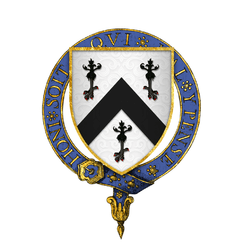Reginald Bray
Sir Reginald Bray KG KB (c. 1440 – 24 June 1503) was the Chancellor of the Duchy of Lancaster under Henry VII, English courtier, and architect of the Henry VII Lady Chapel in Westminster Abbey.
Sir Reginald Bray, KG | |
|---|---|
 Arms of Sir Reginald Bray, KG: Argent, a chevron between three eagle's legs erased sable | |
| Chancellor of the Duchy of Lancaster[1][2] | |
| In office 13 September 1486 – 24 June 1503 | |
| Monarch | Henry VII |
| Preceded by | Thomas Metcalfe |
| Succeeded by | John Mordaunt |
| Personal details | |
| Born | 1440 St. John Bedwardine, Worcestershire |
| Died | 1503 |
| Nationality | English |
| Spouse(s) | Katherine Hussey |
Career
.jpg)
Reginald Bray was born about 1440 in St. John Bedwardine parish, then outside of Worcester, the second son of Sir Richard Bray, a surgeon,[3] and educated at the Royal Grammar School Worcester. He worked as Margaret Beaufort's estate officer for twenty years, and had a leading role in the conspiracy to place Henry Tudor on the English throne.[3]
Bray was created a Knight of the Bath at the coronation of Henry VII, and, later, a Knight of the Garter. He also became Treasurer and Chancellor of the Duchy of Lancaster. In 1496 he was created Steward of the University of Oxford.
Surrey deed C.3273
Grant by Thomas, earl of Ormond, to Reginald Bray, knight, of the lordships or manors of Shire and Vachary in Craneley parish, for his life, reserving the advowson of Shire church and the right of entry into Vachary park to hunt, with easement for the said earl, his servants and horses when staying within the lordship of Shire; Reginald providing a chaplain called 'a chauntry prest' to officiate in the chapel of Vachary manor; with letter of attorney authorising John Westbroke to deliver seisin. 28 January 1 Henry VII. Seal.[4]
A new man, his most notable achievement in Government was the restructuring of the King's finances and as the administrator of such, including the King's will, from 1485 until his death, he was the equivalent of the Prime Minister.[5]
Bray continued the work of Edward IV in moving away from the collection of royal revenues through the Exchequer system and instead increasing the application of the Chamber of the Household system to collect money. He was also made paymaster of the unsuccessful operation intended to relieve the Dukedom of Brittany from being annexed by France, although the failures of this mission can in no way be attributed to him.
As well as designing Henry VII's Chapel at Westminster, he also designed St George's Chapel in Windsor Castle and Great Malvern Priory. At St. George's Chapel, the vault is sculpted in various places with Sir Reginald's rebus of a hemp bray to signify his support and design of the chapel.
He also played a major role in the construction of Jesus College in Cambridge and was friends with its founder, John Alcock.
Personal life
Bray married, about 1475, Katherine Hussey (d.1506),[6] the younger of the two daughters and coheirs of Nicholas Hussey of Calais, by whom he had no issue.
Bray died without issue on 5 August 1503, and was buried in St George's Chapel, Windsor.[7] Bray had a brother of the whole blood, John Bray, and an elder half brother, also named John Bray. After litigation, Reginald Bray's estates were divided between his nephew, Edmund Braye, eldest son of his brother of the whole blood, John Bray, and William Sandys, 1st Baron Sandys, who had married Margery Bray, the daughter of Bray's elder brother of the half blood, John Bray.[7]
Notes
| Wikisource has the text of the 1911 Encyclopædia Britannica article Bray, Sir Reginald. |
- "The Tudor century", Ian Dawson. Nelson Thornes, 1993. ISBN 0-17-435063-5, ISBN 978-0-17-435063-7. p. 101.
- "Lives of the Queens of Scotland and English Princesses, Volume 1", Agnes Strickland. BiblioBazaar, LLC, 2008. ISBN 0-559-71809-8, ISBN 978-0-559-71809-0. p. 11.
- Gunn 2016, p. 7.
- A Descriptive Catalogue of Ancient Deeds: Volume 3 pages 340–351
- "Complete peerage of England, Scotland, Ireland, Great Britain and the United Kingdom, extant, extinct, or dormant, Volume 2", George Edward Cokayne. G. Bell & sons, 1889. p. 11
- Katherine's sister, Constance Hussey, married Henry Lovell.
- Condon 2004.
References
- Condon, M.M. (2004). "Bray, Sir Reynold (c.1440–1503)". Oxford Dictionary of National Biography (online ed.). Oxford University Press. doi:10.1093/ref:odnb/3295. (Subscription or UK public library membership required.)
- Gunn, Steven (2016). Henry VII's New Men and the Making of Tudor England. Oxford University Press.CS1 maint: ref=harv (link)
- . Dictionary of National Biography. London: Smith, Elder & Co. 1885–1900.
| Political offices | ||
|---|---|---|
| Preceded by Thomas Metcalfe |
Chancellor of the Duchy of Lancaster 1486–1503 |
Succeeded by Sir John Mordaunt |